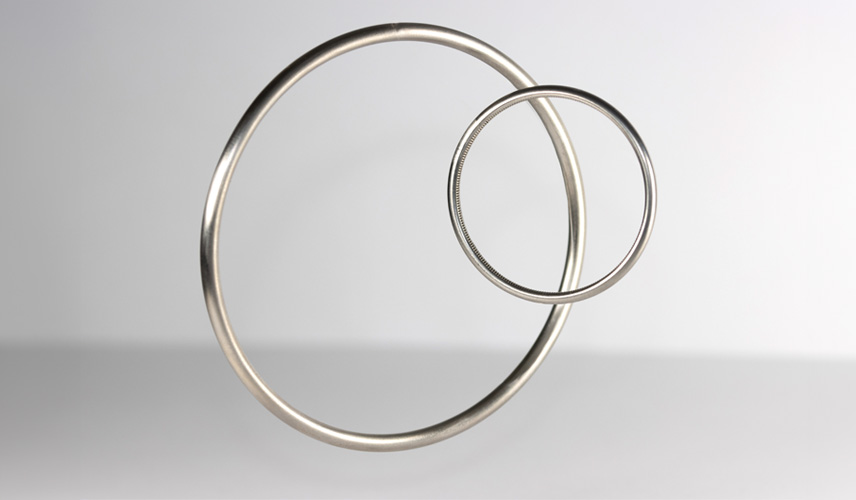Ring Material
Resilient metal seals from Eurosealings have demonstrated their reliability worldwide under the most diverse extreme operating conditions. Our seals excel in situations where traditional seals fall short. These include extreme temperature ranges, high pressures, radioactive environments, compensation for flange misalignments, or strict leakage rates.
Several stainless steel and nickel alloys are available to manufacture metal seals. The optimal material choice always depends on the application’s requirements and specifications.
In this article, we’ll explore the various options and discuss the reasons and situations for selecting each one.
The following table gives an overview of the standard ring materials for O-rings, C-rings, and U-rings. Other materials are available on request.
| Ring Material | O-Rings | C-Rings | U-Rings | Order Code | Material no. |
| SS304 | x | 1 | 1.4306 | ||
| SS321 | x | 3 | 1.4541 | ||
| Inconel 600 | x | 4 | 2.4816 | ||
| Inconel X-750 | x | x | 5 | 2.4669 | |
| Inconel 718 | x | x | 7 | 2.4668 |
We’ll go over them one by one.
SS304
SS304 is an austenitic stainless steel containing chromium (18-20%) and nickel (8-10.5%) as the main non-iron constituents. It’s one of the most commonly used stainless steels.
SS304 is specified in many standards, such as the SAE Steel Grades, ISO, UNS, JIS, and EN/DIN. As such, it is represented by numerous different codes, depending on the numbering system or ISO standard used.
| Type | UNS | JIS | EN/DIN | EN/BS | EN/NF | ISO | GB | GOST |
| 304 | S30400 | SUS304 | X5CrNi18-10 | 304S31 | Z7CN18.09 | 11 | 0Cr18Ni9 | 08KH18H10 |
In many situations, SS304 is a proper default choice for standard resilient metal C-rings. It has excellent resistance to a wide range of atmospheric environments and corrosive media.
It’s applicable for a broad range of applications, SS 304 can be used in the lower temperature ranges up to 371°C (depending of the application parameters)
S321
SS321 is also austenitic stainless steel that contains 17-19% chromium and 9-13% nickel, but it is stabilized with titanium at a minimum amount of 5 times the carbon content.
This stabilization with titanium allows the alloy to resist intergranular corrosion after being subjected to temperatures in the chromium carbide precipitation range. Its titanium content provides improved resistance against sensitization and resultant intergranular corrosion.
Depending on the numbering system or standard in use, S321 is identified by various codes.
| Type | UNS | JIS | EN/DIN | EN/BS | EN/NF | ISO | GB | GOST |
| 321 | S32100 | SUS321 | X6CrNiTi18-10 | 321S31 | X6CrNiTi18-10 | 15 | 0Cr18Ni10Ti | 08KH18H10T |
In general, S321 is a good standard choice for applications that require metal O-ring sealings in lower temperature ranges up to 260°C, depending your application parameters, SS 321 can be used up to 371°C
For higher temperatures, chromium can react with carbon present in the steel to form chromium carbides. This would make the chromium-depleted zone more susceptible to corrosive attacks.
Depending on the exact situation and environment, we usually advise against steel for higher temperature ranges and steer towards the use of Ni-Alloy.
Inconel
Inconel is a nickel-chromium-based superalloy designed to exhibit superior mechanical strength, resistance to thermal creep deformation, good surface stability, and resistance to corrosion or oxidation. It’s ideal for O-rings, C-rings, and U-rings that need to operate in extreme conditions.
Whether to choose Inconel 600, Inconel X-750, or Inconel 718 depends on the specifics of the application, and the temperature ranges.
- Inconel 600: up to + 538°C
- Inconel 718: up to +750°C
- Inconel X-750: up to +750°C
Note that these materials are also qualified for lower temperatures. However, if your operation parameters don’t need characteristics of Inconel, you might end up with an unnecessarily expensive solution for your application.
When O-rings or C-rings are exposed to higher temperatures than the given ranges, they can exhibit irreversible plastic deformation. To counteract this deformation, certain design modifications or supplementary components can sometimes be used. However, this is very application-specific and is the expertise of our team.
If your application needs to operate at a temperature higher than +750°C, contact our specialists to discuss your project.
Industrial Standards
At EUROSEALINGS, we produce resilient metal seals for various extreme conditions. Such diverse conditions can often arise even within the same industry.
The selection of materials for metal O-rings, C-rings, and U-rings is intricately tied to their intended application, temperature ranges, expected pressures, and required leakage rates.
As example, the environmental context of an oilfield, be it a desert, the freezing landscapes of Russia, or the heart of the Atlantic Ocean, significantly influences the specifications due to diverse weather and temperature challenges..
In these situations, material choices for sealing rings are strictly dictated by established standards, with hardly any flexibility. The application demands adhering to specific standards, such as NORSOK M710 or NACE MR0175.
We can offer seals conform to these standards.
